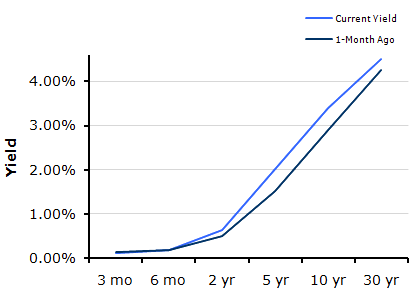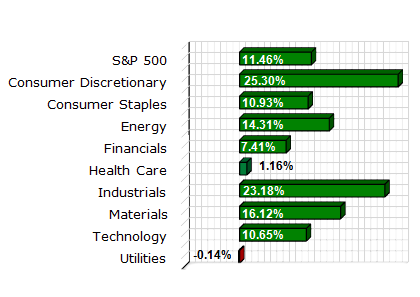
Market Commentary by Scott J. Brown, Ph.D., Chief Economist

The economic data were mixed, but generally consistent with a continued expansion. Retail sales rose more than expected in November, while figures for September and October were revised higher. Industrial production rose moderately, as a drop in auto production was offset by gains in other manufacturing sectors. Residential construction figures were mixed, but single-family activity improved. Consumer inflation figures remained low.
As expected, the Federal Open Market Committee left the target range for the overnight lending rate unchanged (at 0% to 0.25%), kept it’s conditional commitment to keep short-term rates low for “an extended period,” and did not alter its asset purchase plans ($600 billion by the end of Q211). In its economic assessment, the FOMC noted that the recovery “is continuing,” but “at a rate that has been insufficient to bring down unemployment.” Congress approved the tax cut package. European debt worries continued to simmer.
Next week, the economic data bunch up ahead of Friday’s holiday. November personal income and spending figures will help fill in the GDP picture for Q410, but are unlikely to alter the underlying picture of the economy. Looking ahead, the markets will be very interested in the December Employment Report (due January 7).
Indices
| Last | Last Week | YTD return % | |
| DJIA | 11499.25 | 11370.06 | 10.27% |
| NASDAQ | 2637.31 | 2616.67 | 16.22% |
| S&P 500 | 1242.87 | 1233 | 11.46% |
| MSCI EAFE | 1629.47 | 1619.74 | 3.08% |
| Russell 2000 | 776.56 | 767.63 | 24.17% |
Consumer Money Rates
| Last | 1-year ago | |
| Prime Rate | 3.25 | 3.25 |
| Fed Funds | 0.22 | 0.13 |
| 30-year mortgage | 5.07 | 5.08 |
Currencies
| Last | 1-year ago | |
| Dollars per British Pound | 1.562 | 1.633 |
| Dollars per Euro | 1.323 | 1.454 |
| Japanese Yen per Dollar | 84.180 | 89.700 |
| Canadian Dollars per Dollar | 1.006 | 1.060 |
| Mexican Peso per Dollar | 12.417 | 12.707 |
Commodities
| Last | 1-year ago | |
| Crude Oil | 87.70 | 72.66 |
| Gold | 1371.91 | 1134.20 |
Bond Rates
| Last | 1-month ago | |
| 2-year treasury | 0.64 | 0.50 |
| 10-year treasury | 3.40 | 2.89 |
| 10-year municipal (TEY) | 5.20 | 4.39 |
Treasury Yield Curve – 12/17/2010

S&P Sector Performance (YTD) – 12/17/2010

Economic Calendar
| December 22nd | — | Real GDP (3Q10, 3rd estimate) Existing Home Sales (November) |
| December 23rd | — | Jobless Claims (week ending December 18th) Personal Income, Spending (November) Durable Goods Orders (November) Consumer Sentiment (December) New Home Sales (November) |
| December 24th | — | Christmas Holiday (markets closed) |
| December 28th | — | Consumer Confidence (December) |
| December 30th | — | Chicago Purchasing Managers Index (December) Pending Home Sales (November) |
| January 7th | — | Employment Report (January) |
| January 25th/26th | — | FOMC Meeting |
Important Disclosures
Past performance is not a guarantee of future results. There are special risks involved with global investing related to market and currency fluctuations, economic and political instability, and different financial accounting standards. The above material has been obtained from sources considered reliable, but we do not guarantee that it is accurate or complete. There is no assurance that any trends mentioned will continue in the future. While interest on municipal bonds is generally exempt from federal income tax, it may be subject to the federal alternative minimum tax, state or local taxes. In addition, certain municipal bonds (such as Build America Bonds) are issued without a federal tax exemption, which subjects the related interest income to federal income tax. Investing involves risk and investors may incur a profit or a loss.
US government bonds and treasury bills are guaranteed by the US government and, if held to maturity, offer a fixed rate of return and guaranteed principal value. US government bonds are issued and guaranteed as to the timely payment of principal and interest by the federal government. Treasury bills are certificates reflecting short-term (less than one year) obligations of the US government.
Commodities trading is generally considered speculative because of the significant potential for investment loss. Markets for commodities are likely to be volatile and there may be sharp price fluctuations even during periods when prices overall are rising. Specific sector investing can be subject to different and greater risks than more diversified investments.
Tax Equiv Muni yields (TEY) assume a 35% tax rate on triple-A rated, tax-exempt insured revenue bonds.
![]() Material prepared by Raymond James for use by its financial advisors.
Material prepared by Raymond James for use by its financial advisors.
The information contained herein has been obtained from sources considered reliable, but we do not guarantee that the foregoing material is accurate or complete. Data source: Bloomberg, as of close of business December 16th, 2010.
©2010 Raymond James Financial Services, Inc. member FINRA / SIPC.


